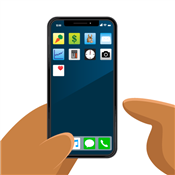Automatic Savings Apps
Saving money is hard. But automatic savings apps help make it easy. Read this list to find the best app for your saving money goals.
 |
| © CreditDonkey |
Spending every dollar you make is a hard habit to break. And you're not alone.
40% of Americans don't have enough saved to cover a small emergency. But it's never too late to start. An automatic savings app can help you build that emergency fund without thinking.
You can set up rules to help you budget. Like, round up spare change from everyday purchases. Or, punish yourself by saving $5 if you ruin your diet by eating fast food. Some apps will even invest money for you.
To help you get a grip on your finances, let's unpack 10 of the best micro-saving apps. Take a look at their features, fees and how to transfer money.
- Chime for saving every payday
- Digit for smart saving
- Qapital for rule-based savings
- Qoins for reducing debt
- Clarity Money for better money habits
- Acorns for new investors
- Stash for micro-investing
- Tip Yourself for self-motivated savers
- Keep the Change for Bank of America customers
$20 Investment Bonus
- Open an Acorns account (new users only)
- Set up the Recurring Investments feature
- Have your first investment be made successfully via the Recurring Investments feature
🏆 For Saving Every Payday: CHIME
Chime is a mobile app. It lets you set aside a percentage of your paycheck into savings.
If you open an account with Chime, they give you a Visa debit card, a spending account, and an optional savings account. Every time you use the debit card to make a purchase or pay a bill, the app rounds up the money to the nearest dollar. The money is then automatically transferred into the savings account.
Pros
- No fees for overdrafts, transfers, or foreign transactions. In addition, no monthly service fees or minimum balance requirements.
- Two automatic saving options.
- Intuitive and user-friendly mobile interface.
Cons
- $5,000 single transaction limit. If you need to pay for a larger lump sum item like a rent check with fees, you may need to use an alternative option.
- Chime does not support joint account holders.
For Smart Saving: DIGIT
Digit is an automatic savings app. It uses an algorithm to calculate how much users should put aside. Here's how it works: When you link your bank information, Digit's technology analyzes your spending and cash flow to see how money moves through your accounts.
Then the savings app will determine how much of your money is available to save each week. The app will pull anywhere from $5 to $50 every couple days to save.
Digit promises not to overdraft your account. If they mess up, they cover your overdraft fees.
The service is free for the first month, but $5 a month after.
Pros
- Account data is secured by 256-bit encryption, the same level of security as the military.
- The easy-to-use interface works through text commands. If you don't like using texting to manage the app, there are other ways to manage your savings account.
- The app automatically calculates and distributes your savings toward your goals.
Cons
- $60 a year ($5/monthly) is pretty steep if you're only saving a little each month.
- Digit does not offer interest. There is a "Savings Bonus," paid every 3 months, which equates to 1% annualized. This is much less than many savings accounts available right now.
30 Days for Free
Try out 30 days of Digit for free then just $5/month.
For Rule-Based Savings: QAPITAL
A hybrid automatic savings/personal finance app, Qapital lets you set aside money based on your goals. It asks you to set up "rules" to prompt savings.
Say you want to save $1,000 for your upcoming trip to the Bahamas. You set that as a financial goal, then create a "rule" to save money. For example, you could save $50 toward your goal every time you spend money on gas.
The "rules" can be more interesting and complex. You could trigger saving money when you watch TV, for example, or spend on purchases like a flight.
Pros
- More unique ways to save money than other automatic savings apps.
- Tiered pricing plans, so you can pay for what you need.
- Debit card option.
- "Passive" saving—once you set a goal, it automatically triggers savings.
Cons
- Tiered pricing means you'll pay to save. The cheapest is $3 a month, while the most expensive is $12/monthly.
- Rule-setting means Qapital is not as user-friendly as other apps.
- Negative reviews from users, including difficulty linking checking account and pausing rules.
For Reducing Debt: QOINS
Qoins is an automated savings app. It helps make payments toward your debt.
Here's how it works: The app determines how much you can save each day based on your habits. It will set aside anywhere from $0.50 to $5.00 a day using spare change "roundups."
Qoins withdraws the spare change each month and makes a payment toward your debt at the end of each month. The app uses bank-level encryption and does not store your banking information.
Pros
- Using an automated savings app to pay off your debt can help raise your credit score over time.
Cons
- Qoins focuses only on debt. If you are looking for a more general savings app with a wider focus, this app may not be for you.
For Better Money Habits: CLARITY MONEY
Clarity Money is a free money management app from Marcus by Goldman Sachs.
Clarity Money's main goal is to help you understand your own money habits and identify areas you can save. The app helps you create a budget, keep track of your expenses, organize monthly bills, and monitor your credit score.
You also have the option to open a Marcus Online Savings Account through the app. Marcus offers a very competitive interest rate to help grow your money. You can set up automatic deposits to save effortlessly.
Pros
- Marcus Savings Account has no monthly service fees and no minimum to open.
- See how you're spending your money every month, and how much you have left to spend.
- Helps identity recurring expenses, so you don't waste money on unwanted subscriptions.
Cons
- Budgeting feature is not as robust as other budgeting apps.
For New Investors: Acorns
Acorns is a hybrid investment and savings app. It uses the concept of spare change to save and invest your money.
Unlike other automatic savings app options, Acorns is an investing account—not a high-yield savings account. It will link with your bank account and automatically transfer the spare change from your spending into a portfolio customized for you.
In addition, Acorns now has a "roundup multiplier," where you can increase your roundups from two to 10 times. For example, with a $0.45 roundup, a 10x multiplier could add $4.50 to your Acorns account.
If you're looking for an entry-level investing platform, Acorns is a great choice. However, for professionals who have experience investing and want a more thorough way to invest, Acorns may not be the best fit.
Pros
- No transaction fees for investing. This means you can deposit a large amount of money and then take money out as you need it.
- No trading fees of any kind.
- If you set up regular contributions, you can save thousands in your IRA or Roth IRA. If you save thousands, the small monthly fee may be worth it.
Cons
- Acorns invests your funds rather than transferring them to a savings account. As with any investment, you risk losing some of your money.
- Acorns plans start at $3 a month. However, free checking accounts have similar benefits for no fees.
- For smaller amounts of money, Acorns is an expensive option and may not be worth the price.
$20 Investment Bonus
- Open an Acorns account (new users only)
- Set up the Recurring Investments feature
- Have your first investment be made successfully via the Recurring Investments feature
For Micro-Investors: STASH
Much like Acorns, Stash micro-invests your savings. You can buy fractions of shares with less money than whole shares would cost.
Stash wants to help you learn how to invest properly. Their app is centered around that philosophy. It has a strong mix of investment options, including 60 ETFs and 150 individual stocks.
For $3 a month, users get access to brokerage and bank accounts in addition to a retirement account. For $9 a month, you'll get all of the above in addition to two custodial accounts for minors, a metal debit card, a robust rewards program, and a research report.
Even though it does charge monthly, Stash has no investing minimums and no minimum account balance.
If you're looking to get into investing, this app is one of your best options. Stash lowers the barrier to entry and provides educational tools to get you the help you need when learning about investing.
Pros
- Start investing with little money. And no account minimum means you don't have to commit a large sum of cash to their app.
- Stash features educational content and support to help users learn about investing and portfolio management.
- Few fees, including no charge on transfers or annual fees.
Cons
- Compared to other alternatives, Stash is expensive. A similar fund at Fidelity would cost you $10 less annually to operate and maintain.
- Stash is an investment app, which means unlike with a savings account, you could lose rather than make money.
Stash: Sign Up and Get $5
- Sign up, add at least $5 to your account and get a $5 bonus.
- Invest with fractional shares
- Get portfolio recommendations
For Self-Motivated Savers: TIP YOURSELF
Tip Yourself is one of many automatic money savings apps that target your spare cash. This free platform lets you transfer money into your very own "tip jar" to motivate you to save.
The concept is simple: Link up your bank account and "tip yourself" through a bank transfer. Every day you tip yourself, the date on the app's calendar turns green.
That means you are one step closer to your goals. Users can even categorize tips by average per week or month.
Pros
- Completely free, unlike other automatic savings apps.
- Focused on positive reinforcement and community with comments from users across the world. Having accountability may help some people save for their goals.
- Straightforward savings plan—you tip yourself and the money transfers into your own FDIC-insured savings account.
Cons
- No automated saving option. You need to manually transfer money.
- Changing your linked bank account can be a hassle—you have to email the support account yourself.
Works on: iPhone, Android
For BANK OF AMERICA Customers: KEEP THE CHANGE
If you're a Bank of America customer, consider their Keep the Change savings program. The program lets users transfer spare change to an account they choose.
Here's how it works: You enroll your Bank of America debit card into the savings program. After spending money using your card, Bank of America will round up your purchases to the nearest dollar and transfer the change to a checking account, savings account, or child's savings account.
Pros
- If you already have a Bank of America bank account and debit card, this program lets you opt in without signing up for another program or app.
- Free for anyone with a Bank of America account and debit card.
Cons
- Debit cards do not provide the same protection or benefits as credit cards. Using your debit card for every purchase can put you at risk for theft or fraud since charges are immediately deducted from the card.
- If you use your credit card for most purchases, this program will not benefit you at all.
Works on: iPhone, Android
What Experts Say
Budgeting isn't easy. But you don't have to go it alone.
As part of our series on personal wealth and saving, CreditDonkey asked an industry expert to answer some of readers' most pressing questions:
- Why does it feel worse psychologically to lose money than it does to win money?
Here's what he had to say:
Bottom Line
Automatic savings apps are an easy way to save money. All you need to do is choose the right app for you and set up your savings preferences—the apps do the rest.
However, if you're not careful, monthly costs and added fees can outweigh the benefits of using these app.
Write to Samantha Tatro at feedback@creditdonkey.com. Follow us on Twitter and Facebook for our latest posts.
Note: This website is made possible through financial relationships with some of the products and services mentioned on this site. We may receive compensation if you shop through links in our content. You do not have to use our links, but you help support CreditDonkey if you do.
|
|
|





